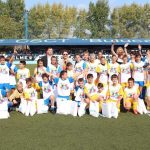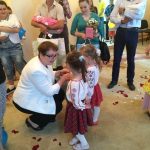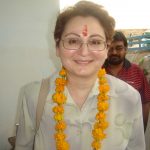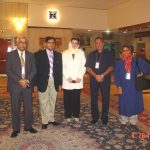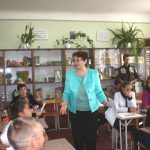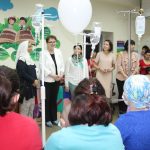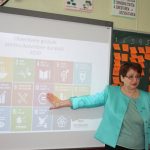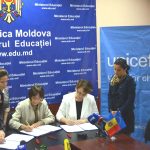Dr. Nune Mangasaryan (MPH ‘97) is one of the first graduates of the Master of Public Health (MPH) program of the American University of Armenia (AUA). She has almost 40 years’ experience in public service and international development. She has had a successful career with UNICEF holding several high-level positions. In the below interview, Dr. Mangasaryan shares a few interesting particulars about her study years at AUA, extensive work experience at UNICEF, the most rewarding and challenging moments in her career, future plans, and much more.
Tell us about your educational experience in Armenia and abroad.
I graduated in 1982 from Yerevan State Medical University with an MD degree specializing in Internal Medicine. I worked as a practicing medical doctor for ten years after graduation. Then, I learned from a friend about the certificate program in public health at the American University of Armenia. This was the first public health program in which I enrolled. But right after the Master of Public Health program opened, I applied for admission to that, as well. Hence, I was in the first cohort of MPH alumni who graduated in 1997. Subsequently, I also participated in a number of short-term educational pursuits, such as study tours, training courses, certificate programs, and workshops, not only in public health, but also on topics in human rights and child development. As I gradually moved to leadership positions, I also took courses to boost my managerial and supervisory skills.
How has your MPH degree earned at AUA contribute to your current success?
Well, I think it was revolutionary in my case. It changed my life, not only my career. When we graduated from the certificate program, about 12 people from our cohort were invited to the Ministry of Health. The Deputy Ministers at the time interviewed us and several of us, including me, received job offers at the Ministry. I immediately got involved in healthcare reforms. For me, that was a complete shift of roles in the public health system, from individual treatment of patients to reforming the whole system. This is how AUA transformed my life. AUA changed it not only from the perspective of public health, but also significantly improved my language skills. When I entered AUA, my English was at a very basic level. Because of English scores, I was actually admitted conditionally taking into account my high standing in studies at the Medical University. At AUA I reached a much higher level of English and also acquired computer skills.
The MPH degree was revolutionary not only for me but also for Armenia. In the Soviet Union, we did not actually have a strong public health system. Healthcare was mainly focused on the treatment of one patient at a time, rather than looking into health issues at the population level and prevention of diseases.
You have guided the development of national health care reforms and policies. What is your most notable achievement?
I was mainly involved in reforms dealing with primary healthcare – an area that is very dear to me. I saw a lot of potential in the field and substantial milestones we could achieve. Within that working group, we developed a package of reforms; then, I also participated in the project implementation unit supported by the World Bank. Our aim was to make primary healthcare work the way it should work, that is to say, to ensure that patients receive comprehensive primary healthcare which also helps them to stay healthy, instead of turning to the system when they are already ill. I believe the policies we developed were very important in terms of primary care capacity and infrastructure development.
 How did your career at UNICEF start?
How did your career at UNICEF start?
I was the deputy director of NIH [National Institute of Health] at that time. In fact, I didn’t even know that there is a position at UNICEF, but one of my friends had sent them my CV, thinking that I am a perfect fit for it which I only learned later. I was invited for an interview, which I decided to attend, and was offered the position which made me have a serious thought about this perspective. Working for the United Nations was attractive and would provide a new career path. So, I decided to try. I held the second-highest position in the country office, but actually stayed in that position very briefly as I was offered an international position at UNICEF.
You have almost 40 years’ experience in public service and international development. Tell us about the most rewarding moments.
Well, there were so many. At UNICEF, my experience was related to children. When you work for children and see how their lives change, you have very many special moments. You know, staff surveys at UNICEF show that close to 100% of staff are proud to work at UNICEF. You can have that rewarding feeling every time you visit countries with UNICEF programs. I can bring one example from hundreds and hundreds of cases. In many countries, there are severely malnourished children. I worked as senior nutrition adviser for many years at UNICEF headquarters visiting those countries. UNICEF started a program with the use of therapeutic foods high in nutrient value and vitamins. I remember visiting a small hospital in India with severely malnourished children. With the help of therapeutic foods, those children were able to regain their health and weight in just two-three weeks.
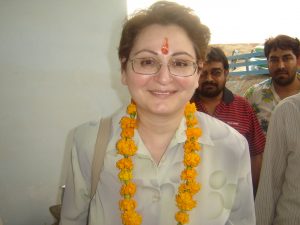 From 2004 to 2012 you were on short missions to UNICEF Regional and Country offices in almost all continents. Which of these missions would you consider the most challenging and why?
From 2004 to 2012 you were on short missions to UNICEF Regional and Country offices in almost all continents. Which of these missions would you consider the most challenging and why?
I can mention a couple of visits to areas with poor populations where the situation of children was striking. Usually, when I go to different countries, my role is to ensure a high level of advocacy with decision-makers and national policy development. As an example, in one country the prime minister had a separate one-on-one meeting with me to understand the best solutions to the challenging issues of child nutrition and growth in their country.
When I have missions in such countries, I usually ask to take me to the poorest villages with the poorest households to see how they live. There were two very striking cases I have observed. One was in India. I was taken to the poorest household in one of the villages. There was actually no house – they were living under the open air. No kitchen. They cooked something on the fire if they managed to find any food. I asked to show me the food they had. All they had was a small jar of rice. And the other case was in Ethiopia. A similar household was living in about 10 square meter hut divided into two parts: a family with three children and two goats. I have seen similar challenging situations in other locations in the world.
Tell us about your current position as Manager of UNICEF’s Partnership with the Governments of Central and Eastern Europe and Central Asia at UNICEF’s Headquarters in New York.
My role is specifically related to UNICEF’s partnership with the governments of 27 countries in Central and Eastern Europe and Central Asia: to ensure a dialogue with these governments’ missions/representations to the UN Headquarters in New York on different child rights issues and related topics at UN platforms, committees, agenda items of high-level political forums. We work with these missions to ensure that child rights are protected. We organize many joint events on different human rights issues at the New York headquarters level. Numerous visits and high-level bilateral meetings take place. We also work on resource mobilization for UNICEF’s programs since a number of countries in the region I am dealing with are donors to UNICEF.
What are your future plans?
I would like to come back home. Last summer when I came to Armenia for a summer vacation, I saw something new at the airport. At the arrivals, there was a big poster that read “Welcome home!” in three languages. You can imagine how many countries I have been to; they all welcome, but they welcome in their respective country’s name. This poster was welcoming home, not just to Armenia, all the visitors – not only Armenian citizens as myself, but also Diasporans, foreigners, tourists, everyone!. This is something that triggered in me the wish to come back and spend more time with those family members who live here and, of course, to be helpful for Armenia. The events that took place in 2018 encouraged many of us to seek ways we can be helpful to our country.
You made a donation to the Alumni Scholarship Endowment Fund. Why, do you think, AUA alumni should support their alma mater?
Maybe some of the alumni who graduated from AUA in later years do not feel the same as I do and my classmates do. When I entered AUA in those difficult years in Armenia, I received not only full tuition coverage, but also a stipend, in recognition of my high academic performance. AUA was even rewarding students with good grades. Considering the difficult times in our country, that was a big support for students. Having had such an experience at AUA, we have to give back. Definitely we should!

